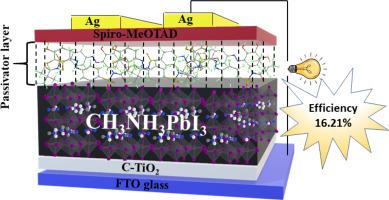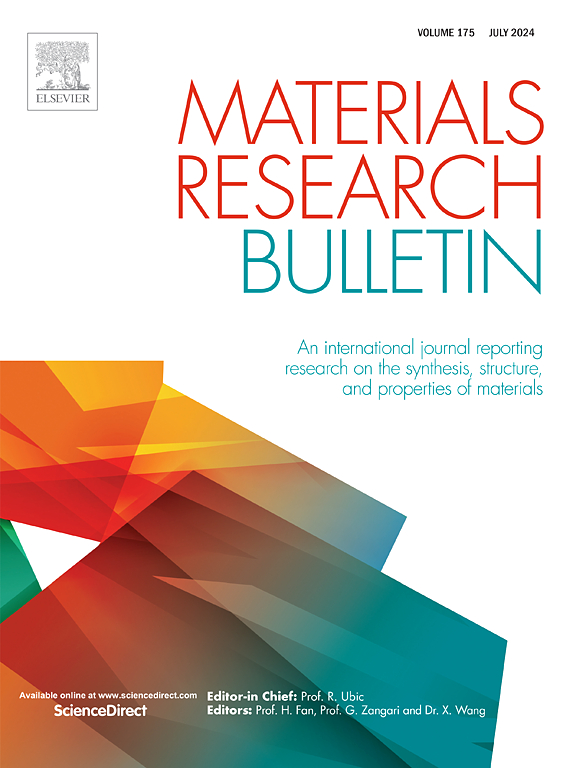Passivator materials based on the benzothiazole-sulfonamide hybrid: Synthesis, optical, electrochemical properties, and molecular modeling for perovskite solar cells
IF 5.3
3区 材料科学
Q2 MATERIALS SCIENCE, MULTIDISCIPLINARY
引用次数: 0
Abstract
This study presents the synthesis of N-(4-(N-carbamimidoylsulfamoyl)phenyl)benzo[d]thiazole-2-carbohydrazonoyl cyanide (N![]() CSBC), a novel passivator material for perovskite solar cells (PSCs). The structure was confirmed by FTIR, ¹H NMR, and ¹³C NMR, while Hall-effect measurements revealed a hole mobility of 1.15 × 10³ cm²/Vs. UV–Vis analysis showed absorption peaks at 295 and 422 nm, corresponding to transitions related to azo groups and aromatic rings in N
CSBC), a novel passivator material for perovskite solar cells (PSCs). The structure was confirmed by FTIR, ¹H NMR, and ¹³C NMR, while Hall-effect measurements revealed a hole mobility of 1.15 × 10³ cm²/Vs. UV–Vis analysis showed absorption peaks at 295 and 422 nm, corresponding to transitions related to azo groups and aromatic rings in N![]() CSBC. The compound exhibited an optical energy gap of 2.47 eV, consistent with DFT-based molecular modeling. Thermal stability and electrochemical properties further validated its suitability for photovoltaic applications. Incorporating N
CSBC. The compound exhibited an optical energy gap of 2.47 eV, consistent with DFT-based molecular modeling. Thermal stability and electrochemical properties further validated its suitability for photovoltaic applications. Incorporating N![]() CSBC into PSCs with an FTO/c-TiO2/MAPbI3/N
CSBC into PSCs with an FTO/c-TiO2/MAPbI3/N![]() CSBC/spiroMeOTAD/Ag device configuration resulted in a power conversion efficiency (PCE) of 16.21 %, compared to 14.47 % for the control. This work highlights N
CSBC/spiroMeOTAD/Ag device configuration resulted in a power conversion efficiency (PCE) of 16.21 %, compared to 14.47 % for the control. This work highlights N![]() CSBC's potential for cost-effective, high-efficiency defect passivation in PSCs.
CSBC's potential for cost-effective, high-efficiency defect passivation in PSCs.

基于苯并噻唑-磺酰胺杂化物的钝化剂材料:用于过氧化物太阳能电池的合成、光学、电化学特性和分子建模
本研究介绍了 N-(4-(N-氨基甲酰亚胺基磺酰基)苯基)苯并[d]噻唑-2-羧酰肼氰化物(NCSBC)的合成,这是一种用于过氧化物太阳能电池(PSC)的新型钝化剂材料。傅立叶变换红外光谱、¹H NMR 和 ¹³C NMR 证实了其结构,霍尔效应测量显示其空穴迁移率为 1.15 × 10³ cm²/Vs。紫外可见光分析表明,在 295 纳米和 422 纳米处出现了吸收峰,这些吸收峰与 NCSBC 中的偶氮基团和芳香环的跃迁有关。该化合物的光学能隙为 2.47 eV,与基于 DFT 的分子建模一致。热稳定性和电化学特性进一步验证了其在光伏应用中的适用性。将 NCSBC 纳入 FTO/c-TiO2/MAPbI3/NCSBC/spiroMeOTAD/Ag 器件配置的 PSC 中,功率转换效率 (PCE) 为 16.21%,而对照组为 14.47%。这项工作凸显了 NCSBC 在 PSC 中进行低成本、高效率缺陷钝化的潜力。
本文章由计算机程序翻译,如有差异,请以英文原文为准。
求助全文
约1分钟内获得全文
求助全文
来源期刊

Materials Research Bulletin
工程技术-材料科学:综合
CiteScore
9.80
自引率
5.60%
发文量
372
审稿时长
42 days
期刊介绍:
Materials Research Bulletin is an international journal reporting high-impact research on processing-structure-property relationships in functional materials and nanomaterials with interesting electronic, magnetic, optical, thermal, mechanical or catalytic properties. Papers purely on thermodynamics or theoretical calculations (e.g., density functional theory) do not fall within the scope of the journal unless they also demonstrate a clear link to physical properties. Topics covered include functional materials (e.g., dielectrics, pyroelectrics, piezoelectrics, ferroelectrics, relaxors, thermoelectrics, etc.); electrochemistry and solid-state ionics (e.g., photovoltaics, batteries, sensors, and fuel cells); nanomaterials, graphene, and nanocomposites; luminescence and photocatalysis; crystal-structure and defect-structure analysis; novel electronics; non-crystalline solids; flexible electronics; protein-material interactions; and polymeric ion-exchange membranes.
 求助内容:
求助内容: 应助结果提醒方式:
应助结果提醒方式:


